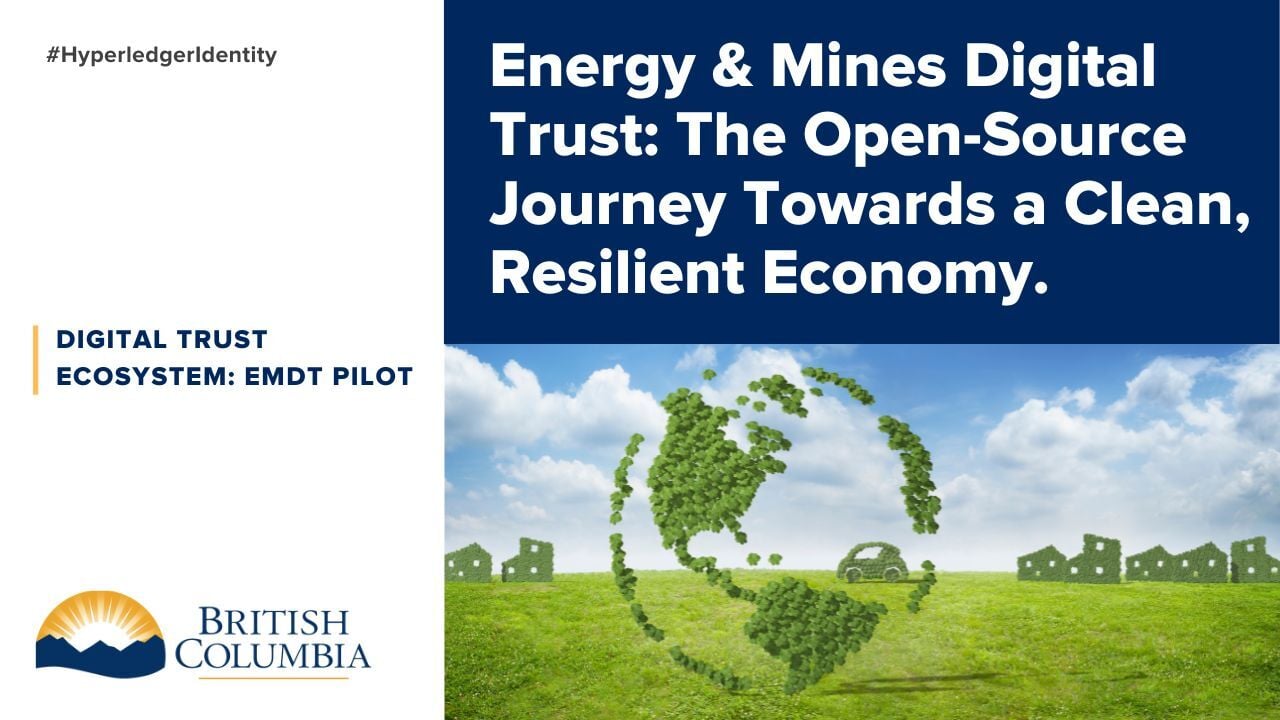Energy & Mines Digital Trust: The Open-Source Journey Towards a Clean, Resilient Economy

As the world works towards climate goals, a government project from Canada is using digital trust technology to make it easier and more secure for natural resource companies to share sustainability data.
Energy & Mines Digital Trust (EMDT) was established by the Government of British Columbia in recognition that we must do more to facilitate the transition to a clean, resilient economy. British Columbia (B.C.), Canada’s western-most province, was the first province in Canada to implement greenhouse gas emission reduction targets and mandatory sustainability reporting for major sectors of the provincial economy. As leaders in climate change legislation, B.C. is well positioned to explore cutting-edge technology in the journey towards a low-carbon economy. To improve trust, accuracy, and efficiency when sharing sustainability data, EMDT is coordinating a digital ecosystem – a network of organizations including environmental auditors, government bodies, mining and energy companies, and non-government organizations.
Improved Sustainability Reporting
Currently, reporting sustainability data can be challenging. Data is difficult to exchange internationally, and consumers cannot always access, or trust, reported data, not to mention the administrative burden.
EMDT’s digital ecosystem makes it possible to exchange sustainability information simply and securely, using digital credentials.
Digital credentials:
- Can be shared quickly and are tamper-proof.
- Allow companies to control their data.
- Guarantee the integrity of the information.
- Preserve privacy in business-to-business interactions.
Digital Trust Ecosystem: EMDT Pilot
EMDT has been testing and refining their technology and governance through multiple pilot projects to demonstrate how sustainability reporting can be made more efficient and trustworthy. Two pilot projects explore greenhouse gas emissions reporting in the mining sector and the natural gas sector. These pilots allow participants to test sharing and receiving digital credentials that include verified GHG emissions data for a specific mine site or natural gas facility.

*Because this is a pilot, the process depicted in this diagram does not satisfy or replace existing regulatory reporting obligations.
The greenhouse gas (GHG) mining pilot builds upon the existing regulatory emissions reporting process in British Columbia. PricewaterhouseCoopers (PwC), an environmental auditor, issues a digital credential to Copper Mountain Mining Company containing verified GHG data. Copper Mountain can then use the Greenhouse Gas Emissions Report Verification Credential as part of their GHG emissions report to British Columbia’s Climate Action Secretariat. Copper Mountain can use the same digital credential to complete voluntary reporting to organizations such as the Open Earth Foundation.
Increased Connections
To facilitate the broad exchange of sustainability data, EMDT used Hyperledger Indy and Hyperledger Aries to create a highly interoperable tool, called Traction. Traction is an API accelerator built on top of Hyperledger Aries Cloud Agent Python (ACA-PY). Traction streamlines the process of sending and receiving digital credentials for governments and organizations.
Hyperledger Aries makes Traction highly interoperable with the technological solutions of companies and organizations around the world. “While two wallets might be different implementations or might be written in different code, they can still exchange data because both wallets use Aries,” explains Kyle Robinson, EMDT’s Senior Strategic Advisor.
Traction makes it easier to integrate digital trust technology into existing lines of business:
- API-first Architecture: Traction is designed with an API-first architecture. This RESTful API allows for integration into existing line-of-business applications already being used by organizations. The Tenant user interface is built on this API to enable adoption prior to integration and for low-use functions.
- Multitenancy: ACA-Py is implemented on a cloud-based server so multiple wallets can be managed with one Traction instance.
- Higher Scalability: Traction is open-source technology, encouraging collaborative refinement, faster release, and higher scalability of the technology.
Collaborative Climate Change Progress
With an increasing emphasis on responsibly sourced products, simplified methods for exchanging sustainability data ensures that B.C. natural resource providers can compete in a global market. Digital trust technology streamlines access to trustworthy sustainability data, allowing businesses, governments, and non-government organizations to work towards climate change goals more efficiently and effectively. Visit our website to learn more about Energy & Mines Digital Trust.
Sign up for the monthly Hyperledger Horizon & /dev/weekly newsletters
By signing up, you acknowledge that your information is subject to The Linux Foundation's Privacy Policy